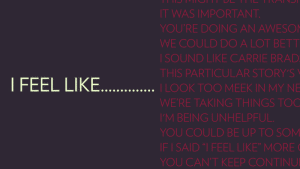Please don’t say ‘I feel like’. The phrase is a sign of a cultural sickening
 When Molly Worthen @MollyWorthen suggests we should all stop saying “I feel like”, I feel like it’s time to listen.
When Molly Worthen @MollyWorthen suggests we should all stop saying “I feel like”, I feel like it’s time to listen.
Ms Worthen recently wrote an excellent piece on the subject of “vague intuition” in The New York Times’ Sunday Review. She described the “I feel like” school of decision-making as a “broad cultural contagion”.
Ms Worthen should know. She has thought a great deal about reason and decision-making. Her most recent book is Apostles of Reason: The Crisis of Authority in American Evangelicalism. She uses George Orwell’s fulminations on language and thought to explain how the use of the words “I feel like” changes society.
“George Orwell put the point simply. If thought corrupts language, language can also corrupt thought.”
She goes on to say that the phrase “I feel like” speaks volumes “about our muddled ideas about reason, emotion and argument — a muddle that has political consequences.”
The biggest problem is that it stops argument.
It “masquerades”, writes Ms Worthen “as a humble conversational offering, an invitation to share your feelings, too — but the phrase is an absolutist trump card. It halts argument in its tracks.”
Why?
In the words of Jing Chai, a senior at the University of Chicago, who spoke to Ms Worthen, when people cite feelings or personal experience, “you can’t really refute them with logic, because that would imply they didn’t have that experience, or their experience is less valid”.
This has profound effects on democracy and society.
Imagine the following. Someone says “I feel like Donald Trump will be the best politician in the history of America and the world, ever.”
You respond with the same sort of statement, only substituting the name “Hillary Clinton” for “Donald Trump”.
There’s no way either of you can discuss why you think or say this. Your feelings and that of the Donald Trump supporter are individual, supreme in their uniqueness and valid for those reasons. You aren’t disagreeing, using logic, facts and argument. You are simply not engaging with each other. This hurts democracy – just look at America’s gridlocked Congress.
For democracy, as Ms Worthen writes, “is premised on civilized conflict. The greatest advance of the modern age has been our ability to argue about society’s most pressing questions without resorting to physical violence (most of the time). Yet the growing tyranny of feelings in the way Americans talk — about everything from how to fund public education to which presidential candidate to support — exerts a subtler kind of coercion on the public sphere.”
In a sense, “I feel like” is a self-obsessed exaltation of the self, a refusal to engage with other people’s opinions or even the facts.

